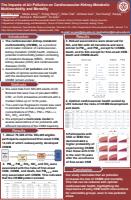

Presenting Author: Xu Gao
Authors: Xu Gao , Meijie Jiang, Shuzhen Liu
Background: Cardiovascular-kidney-metabolic (CKM) syndrome endorses the multimorbid impact of metabolic diseases with target organ damages including chronic kidney disease and cardiovascular diseases. Cardiovascular-kidney-metabolic multimorbidity (CKMM) based on the three conditions is a practical and broader progression indicator of CKM health. However, evidence for the impact of air pollution on the staged development of the three domains of diseases and CKMM, as well as the benefits of optimal cardiovascular health is scarce.
Objectives: To evaluate the air pollution's impact on the temporal progression of CKMM and the modifying effect of cardiovascular health defined by Life’s Essential 8 (LE8).
Methods: Among 383,465 UK Biobank participants with a median follow-up of 12.52 years, a multi-state model was applied to explore air pollution's impact on the temporal progression of CKMM and subsequent death, and to test the modifying effect of LE8. Annual averaged levels of three particulate pollutants (PM2.5, PM2.5-10, PM10) and three gaseous pollutants (NO2, NOx, SO2) were matched by individuals’ locations. LE8 is defined based on eight items for maintaining cardiovascular health defined by the AHA.
Results: CKMM development was observed even under a relatively low-level exposure to PM2.5, PM10, NOx, NO2, and SO2 in our study. NOx and NO2 were further related to subsequent death. Per 5-μg/m3 increase in NO2, hazard ratios for transitions from first-onset CKM to CKMM and CKMM to death were 1.030 (95% CI: 1.020-1.040) and 1.036 (95% CI: 1.012-1.060) respectively. Individuals with chronic kidney disease presented the highest risk of developing CKMM than those with the other two disease types. For the same increase in NO2, the risk of developing CKMM increased by 3.8% for individuals with chronic kidney disease but by 3.7% and 2.3% for those with metabolic diseases and cardiovascular diseases, respectively. Optimal cardiovascular health scored by LE8 reduced the risks of CKMM development and death.
Conclusions: Air pollution elevated the risk of CKMM and mortality, which could be mitigated by optimal cardiovascular health. Since many countries’ air quality standards are still above the WHO guideline, health professionals need to prioritize CKM health intervention of vulnerable subpopulations in the earliest manner even in low-polluted areas.
